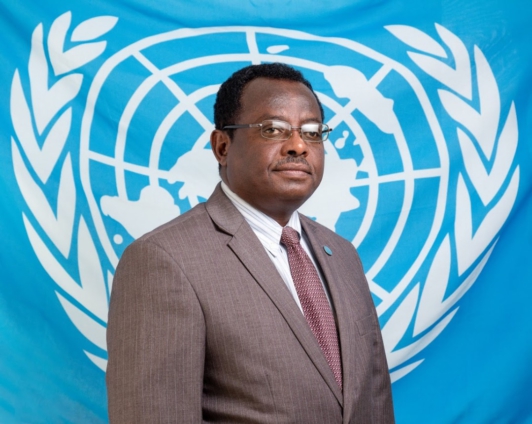These are unprecedented times. The pandemic of such magnitude and global scale has affected each member of this generation with countries around the world hoisting their resources to downscale the massive repercussions brought about by COVID-19.
As Africa starts closing its borders and locking down communities to mitigate the risks, the Food and Agriculture Organization of the United Nations (FAO) is calling for all countries to take urgent measures to lessen the impact on food systems and all dimensions of food security and nutrition.
FAO’s 2019 Africa Regional Overview of Food Security showed that there are 256 million Africans, or 20 percent of the population, who are undernourished. Of these, 239 million are in sub-Saharan Africa. According to the FAO Global Information and Early Warning System, 34 out of the 44 countries currently in need of food external assistance for food, are in Africa.
These stark figures show that we were already vulnerable pre-COVID-19. Unless we take timely measures, we risk a looming food crisis. Measures do not include panic and therefore, panicking is not a method of mitigating the risks. There is enough food around for every African; we cannot replicate the mistakes during the 2007-08 food crisis, and turn this health crisis into an entirely avoidable food crisis.
Another hard lesson for us to learn from was the Ebola Virus Disease outbreak in 2014-16. Quarantines and panic led to a spike in hunger and malnutrition. The suffering worsened as restrictions on movement led to labor shortages at harvest time even as other farmers were unable to bring their produce to market.
The food systems and food supply chains are interlocked, and disruption in one place can have rippling effects. It is therefore paramount that prevention and risk reduction strategies should be in place.
As we know, agriculture is the source of livelihoods for hundreds of millions of Africans. We need to have prompt measures to ensure that food supply chains remain functioning to mitigate the risk of large shocks that would have a considerable impact on everybody, especially on the poor and the most vulnerable.
Vulnerable groups include small-scale farmers, pastoralists, and fishers who are unable to work their land, care for the livestock, or fish. They will also have difficulty accessing markets to sell their products and/or buy with higher prices and limited purchasing power. Informal laborers on the other hand, face job and income losses in harvesting and processing. COVID-19 spares no one. By now, we have millions of children missing school, and most importantly, many unable to partake of school meals they have come to rely upon.
Countries need to meet the immediate food needs of their vulnerable populations, boost their social protection programmes, keep global food trade going, ensure the domestic supply chain gears moving, and support smallholder farmers’ ability to increase food production.
Another worry in the Africa region points to the existing humanitarian crises. Conflict-driven crises continued to be the primary cause of the high levels of severe food insecurity, while drought, floods and other shocks have also aggravated food insecurity conditions locally.
In the Horn of Africa, several countries are facing the worst desert locust crisis in over 25 years.
This is an unprecedented threat to food security and livelihoods, which could lead to further suffering, displacement and potential conflict.
More than 20 million people are already facing severe acute food insecurity, and the locust invasion and the pandemic will drive this figure even higher.
It is therefore critical that donor countries ensure continued delivery of humanitarian assistance where food insecurity is already high. This disease does not recognize borders. Movement of food and trade must remain unabated across borders in compliance with existing food safety standards.
Food supply chain disruption, including hampering the movement of agricultural and food industry workers and extending border delays for food containers, result in the spoilage of perishables and food waste loss.
We must prevent the repeat of these scenarios; it is at times like this that more, not less, global and regional cooperation becomes vital.
Now is the time to show solidarity, act responsibly and adhere to our shared goal of enhancing food security, food safety and nutrition and improving the general welfare of the population in Africa.
We must ensure that our response to COVID-19 does not create unwarranted shortages of essential items and exacerbate hunger and malnutrition.
Amidst this crisis, our FAO teams are working with countries to anticipate and mitigate the impact of the pandemic on food security and livelihoods. We continue to support the efforts to the alleviation of COVID-19’s effects on food trade and markets.
This is the time where our individual efforts must come together as regional aspirations. We have a common goal – keeping Africa food secure and healthy.
Latest Stories
-
Telecel Ghana plants 10,000 additional trees at Chipa Forest Reserve on World Environment Day
1 hour -
Man City sign Wolves defender Ait-Nouri for £31m
1 hour -
Inter appoint Parma boss Chivu as manager
2 hours -
Rev. Francis Kobla Nani De-Souza
2 hours -
Judge dismisses Justin Baldoni’s $400m defamation lawsuit against Blake Lively
2 hours -
Protest hits Kenya after shock death of man held by police
2 hours -
Satellite installer remanded in custody for defiling 3 girls
2 hours -
Car loaded with alleged parcels of Indian Hemp involved in accident at Akatsi
3 hours -
Two washing bay attendants jailed for vehicle theft
3 hours -
Cedi comes under some pressure; one dollar equals GH¢11.60
3 hours -
WHO extends health emergency for mpox as cases climb in West Africa
3 hours -
National Investment Bank PLC: A renewed powerhouse for industrial and economic transformation
3 hours -
LUV FM High Schools Debate: St. Louis Girls and Oppong Memorial emerge victors on Day One contest
4 hours -
Re: Forestry Commission refutes report of illegal fuel station in forest reserve
4 hours -
Scaling climate solutions: GCIC announces 7th annual symposium on innovation
4 hours

